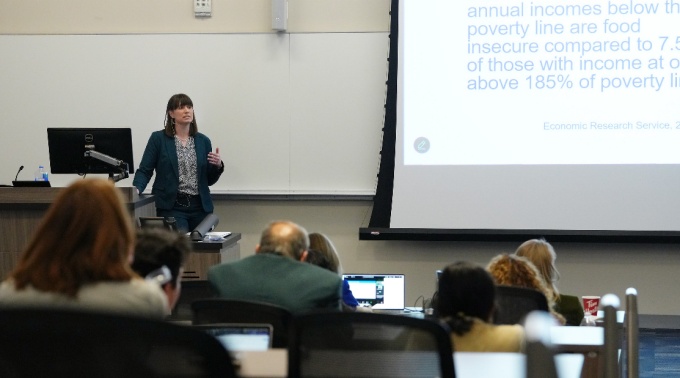Research Expertise

Members of our division eagerly share their expertise. Division chief Rebekah J. Walker, PhD, has presented on structural determinants of food insecurity as a guest speaker at an annual clinical and translational science seminar.
Our faculty and staff members bring rich research expertise to the Division of Population Health, and we aim to transform healthcare and improve population health in Buffalo, Western New York, the nation, and globally.
Our faculty:
- strive to reduce and eliminate racial/ethnic and socioeconomic disparities in chronic disease outcomes
- excel in advanced regression methodologies, including path analysis and structural equation modeling, and the application of machine learning and artificial intelligence methodologies to health
- incorporate health behavior, health economics, and public health principles in their work
- address the multi-level barriers to care that occur across the individual, community, and healthcare system levels for marginalized populations with chronic disease
The faculty are experts in topics including:
- social determinants of health, health risk, and health-related social needs with specific expertise in the food environment, and associations with chronic disease prevalence, outcomes, and complications
- structural inequalities and structural racism, with specific expertise in historic redlining and inequities at the census tract level, and association with chronic disease, mental health, and health indices
- health system improvement, including healthcare delivery, cost and cost-benefit care, evaluation of quality improvement efforts, and implementation science
The faculty have methodological expertise in:
- clinical trial design, with particular emphasis on community-based trials and recruitment and retention of marginalized populations into research activities
- implementation research, including mixed methods methodology
- artificial intelligence and health outcomes, with specific expertise in predictive models
- large database observational study methodology, including causal inference methodologies
- health economics, including cost-utility, cost-benefit, and cost-effectiveness
Our multidisciplinary team covers a variety of disease areas and spanning levels of influence from individuals to health systems to policy by:
- employing diverse methodologies spanning economics, epidemiology, public policy, psychology, and implementation science
- serving as methodological experts on studies investigating pathways through which structural racism influences diabetes outcomes
- supporting health system improvement with a primary focus on primary care integration and leveraging community organizations to improve chronic disease outcomes
- designing, implementing, and analyzing clinical trials
- applying survey methods to observational data and large database observational study methodology
- qualitative and mixed methods study designs
- community based participatory research and implementation science
Members of our division work within the larger context of health services research, incorporating research on social factors, financing systems, organizational structures and processes, health technology, and health behaviors.
We also apply methodologies from a range of fields to understand access, delivery and cost of care — and we integrate social determinants of health into medical care and address health disparities.
Projects
Our current projects include community-based clinical trials, cohorts and cross-sectional studies, as well as large databased analysis studies using AI methodologies aimed to inform policy. These projects cover areas such as:
- intervention development for type 2 diabetes and cardiovascular disease that incorporates behavioral economics principles, including financial incentives and cash transfers
- developing and testing interventions delivered in community-based settings that address social and structural factors impacting adults with diabetes and cardiovascular disease
- examining strategies and implementation outcomes of HIV pre-exposure prophylaxis (PrEP) delivery in high-incidence populations, with an ongoing project in Nigeria aimed at exploring the potential of private community pharmacies as an avenue to improve accessibility
- addressing population health, optimizing health outcomes for vulnerable populations, and investigating disparities in health care costs
The Division of Population health has built infrastructure to support the expansion of population health within the Jacobs School and across UB, the education of trainees in population health, and clinical analytics for UBMD and partner health systems.
We continuously seek to leverage existing resources across the University and create effective infrastructure to grow population health in Buffalo.
Staff members in our division bring important expertise to key positions that bolster critical work.
Key roles include:
Our statistical analysis team comprises master's-level biostatisticians, data analysts, and a system administrator who support the biostatistical and clinical analytics infrastructure within our division.
These staff members utilize their professional experience to provide comprehensive biostatistical support to faculty, fellows and residents. Our biostatisticians, data analysts and systems administrators also support faculty-funded research projects.
Our program assistants, phlebotomists and health educators support active research studies by collecting data and conducting study procedures.
Program research assistants support faculty-led cross-sectional, cohort, and interventional research studies by focusing on participant recruitment and retention, while health educators deliver protocol-driven health education interventions to enrolled participants. In addition, phlebotomists collect specimens and perform phlebotomy services to support outcome assessment for study participants at various community sites.
Our staff also provide critical support coordinating grant submissions, scientific manuscript coordination, collaboration activities, and regulatory and data management activities to ensure compliance and standard procedures across the lifespan of research activities.